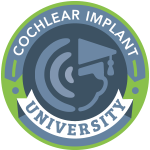Accommodations
There are two basic types of accommodations you may need while you’re in college: academic and residence life. Academic accommodations will ensure that you have access to all of the verbal information shared during a class. Residence life accommodations will ensure that your living arrangements are safe, such as in the event of a fire.
When you start college, you may need a certain set of accommodations or no accommodations, but these needs may change over time. Therefore, we also provide some recommendations to handle your changing needs over the course of your college career.
Academic accommodations can help you reach your full academic potential by ensuring that you have access to all of the verbal information provided in a class.
You may not have needed any (or many) academic accommodations in high school, but the college learning environment is different (larger classrooms, more ambient noise), so you may find that you have different needs. Remember, it’s up to you to ensure that you have the academic accommodations that you need to succeed.
Here are some common accommodations used by other students with cochlear implants. You may be more familiar with some than others. For a full description of these accommodations, download the Academic Accommodations Handout
- Interpreting/transliterating services
- Speech to text services
- Priority registration
- Notetaking services
- Induction loop devices
- Audio recorders
- Testing accommodations
- Classroom accommodations
Do not be afraid to ask for accommodations you need. In certain cases, the entire class may even benefit from the accommodations. For example, asking for visual aids may mean that the entire class receives a handout that the professor prepared to accompany a lecture.
The Office of Disability Services often does not inform professors of your accommodations. Rather, you will get an official letter that outlines your accommodations to share with yours professors. You should make multiple copies of the letter so you can give a copy to each of your professors and keep a copy for yourself for future semesters.
The Resources section contains tips to notify your professor about your accommodations and steps to take if a professor doesn’t implement your accommodations.
If you live on campus, it’s important to work with your school to determine the best living accommodations for you. Your primary contacts will be the Office of Residence Life and Office of Disability Services. The Office of Residence Life often consists of staff, undergraduate students, and graduate students. You should create an open line of communication to obtain the accommodations you need to make your living arrangements safe and comfortable. We suggest you start by meeting with the Office of Residence Life. Here are a few questions to help you get started.
It is important to submit any requests to the Office of Residence Life as soon as possible so the staff can make the necessary changes to your living arrangements. If you wait until the last minute to make request, there may be a delay and you might find yourself in an uncomfortable living situation.
Here are some common accommodations used by other students with cochlear implants. You may be more familiar with some than others. Some of these accommodations may be provided by the Office of Residence Life, such as the visual alert, while you may need to provide others, such as the alarm clock. For a full description of these accommodations, download the Residence Life Accommodations Handout:
- Room equipped with a visual alert
- Visual doorbell signal*
- Shake awake alarm clocks and doorbells
- Telephones with amplified receivers in dorms
*Some students with cochlear implants have mentioned that they don’t like having a doorbell system because other students are tempted to ring it, especially late at night.
You should also create a plan so you know how to handle different emergencies, if they occur when you’re in your dorm. The Resources section contains tips to help you develop an emergency plan.
You may not know all of the academic or residence life accommodations you will need until you have moved in, attended classes, and had time to get used to your new school setting. In addition, some of your needs may change with time. In either case, open communication with the Office of Disability Services and Office of Residence Life can make it easier for you to adjust your accommodations to meet your changing needs.
Here are some possible changes you may need to address:
- Different classrooms with different amounts of ambient noise
- More difficult, dense coursework
- Seminar or discussion-based courses
- New roommates
- New dorm rooms
- Quiet study space
- Land-line or video relay service if your dorm room does not get good cell service
Remember to follow-up on your requests by checking in with the Office of Disability Services and Office of Residence Life. Friendly, but firm, reminders will help you get the accommodations you need.
- Academic Accommodations Handout
- Notifying Professors About Accommodations Handout
- Steps to Take if a Professor Doesn’t Implement Accommodations Handout
- Office of Residence Life Questions Handout
- Residence Life Accommodations Handout
- Emergency Plan Tips Handout
- Introduction Email to a Professor Template

